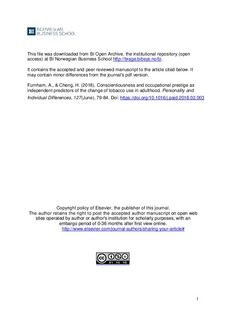Conscientiousness and occupational prestige as independent predictors of the change of tobacco use in adulthood
Journal article, Peer reviewed
Accepted version
Permanent lenke
http://hdl.handle.net/11250/2500039Utgivelsesdato
2018Metadata
Vis full innførselSamlinger
- Publikasjoner fra CRIStin - BI [1015]
- Scientific articles [2181]
Originalversjon
Personality and Individual Differences. 2018, 127: 79-84. 10.1016/j.paid.2018.02.003Sammendrag
This study investigated the association between childhood intelligence, personality traits, parental social class, maternal smoking, educational qualifications and occupation prestige, and smoking status assessed at different ages. The study was based on a British birth cohort with nine follow-ups. At age 54 years, cohort members provided information on current tobacco use (Yes/No) and the frequency of daily cigarettes smoking. Response of the same questions was also collected four years earlier, at age 50 years. Results showed that among the 5316 participants with complete data, there was a significant (p < 0.001) decrease in the rates of current tobacco use from age 50 to age 54 years (17.9% and 15.0%). Logistic regression analyses showed that, whilst educational qualifications, occupational prestige, and three of the Big-Five personality traits (Extraversion, Conscientiousness, and Openness) were all significant predictors of current smoking status at age 54 years. After controlling for the initial smoking status, measured four years earlier, only trait Conscientiousness and occupational prestige were significant and independent predictors of the outcome variable. Low intelligence predicted smoking status >39 years later, mediated by educational qualifications. Implications and limitations are noted.
